Burt A. The Evolution of the British Empire and Commonwealth From the American Revolution
Подождите немного. Документ загружается.

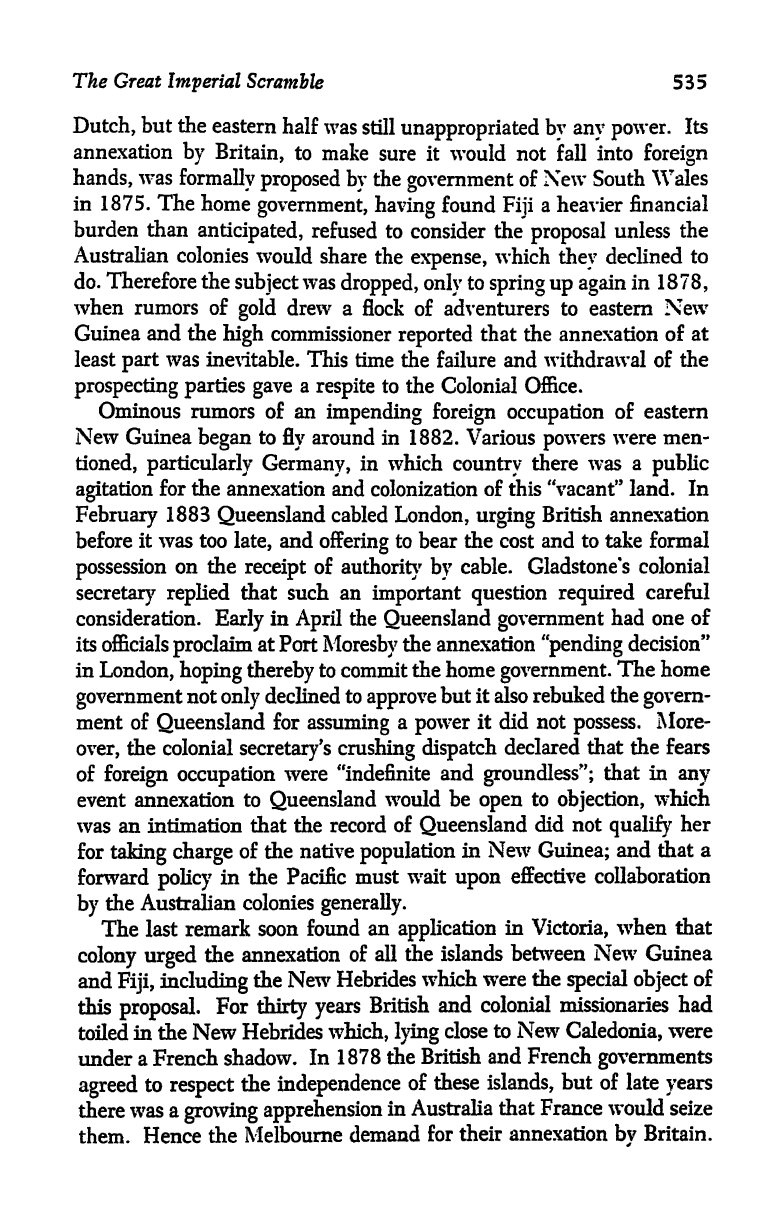
The Great
Imperial
Scramble
535
Dutch,
but the
eastern
half
was
still
unappropriated
by any power.
Its
annexation
by
Britain,
to
make
sure it
would
not fall
into
foreign
hands,
was
formally
proposed
by
the
government
of
New
South
Wales
in 1875. The
home
government,
having
found
Fiji
a heavier
financial
burden
than
anticipated,
refused to
consider
the
proposal
unless
the
Australian
colonies
would
share
the
expense,
which
they
declined
to
do.
Therefore the
subject
was
dropped, only
to
spring
up again
in
1878,
when
rumors
of
gold
drew
a
flock
of adventurers
to
eastern
New
Guinea
and
the
high
commissioner
reported
that
the annexation
of
at
least
part
was
inevitable.
This time the
failure
and withdrawal of
the
prospecting
parties
gave
a
respite
to
the
Colonial Office.
Ominous rumors
of
an
impending
foreign
occupation
of
eastern
New
Guinea
began
to
fly
around in 1882. Various
powers
were men-
tioned,
particularly
Germany,
in which
country
there was
a
public
agitation
for
the
annexation and
colonization
of
this "vacant" land.
In
February
1883
Queensland
cabled
London,
urging
British
annexation
before
it was too
late,
and
offering
to
bear
the
cost
and to take formal
possession
on
the
receipt
of
authority by
cable. Gladstone's
colonial
secretary replied
that such an
important question
required
careful
consideration.
Early
in
April
the
Queensland
government
had
one
of
its officials
proclaim
at
Port
Moresby
the
annexation
"pending
decision"
in
London,
hoping
thereby
to commit
the
home
government.
The home
government
not
only
declined to
approve
but
it also
rebuked
the
govern-
ment of
Queensland
for
assuming
a
power
it
did
not
possess.
More-
over,
the
colonial
secretary's
crushing
dispatch
declared
that
the
fears
of
foreign
occupation
were "indefinite
and
groundless";
that in
any
event
annexation
to
Queensland
would be
open
to
objection,
which
was
an intimation that
the record
of
Queensland
did not
qualify
her
for
taking
charge
of
the
native
population
in
New
Guinea;
and that
a
forward
policy
in the
Pacific
must
wait
upon
effective collaboration
by
the
Australian
colonies
generally.
The
last
remark soon
found
an
application
in
Victoria,
when that
colony
urged
the
annexation
of all
the islands
between New
Guinea
and
Fiji, including
the New
Hebrides
w
7
hich
were the
special object
of
this
proposal.
For
thirty
years
British
and colonial missionaries
had
toiled in
the New
Hebrides
which,
lying
close to
New
Caledonia,
were
under
a French
shadow.
In
1878 the
British
and French
governments
agreed
to
respect
the
independence
of
these
islands,
but
of late
years
there
was a
growing
apprehension
in Australia
that France
would
seize
them. Hence
the
Melbourne demand
for
their annexation
by
Britain.
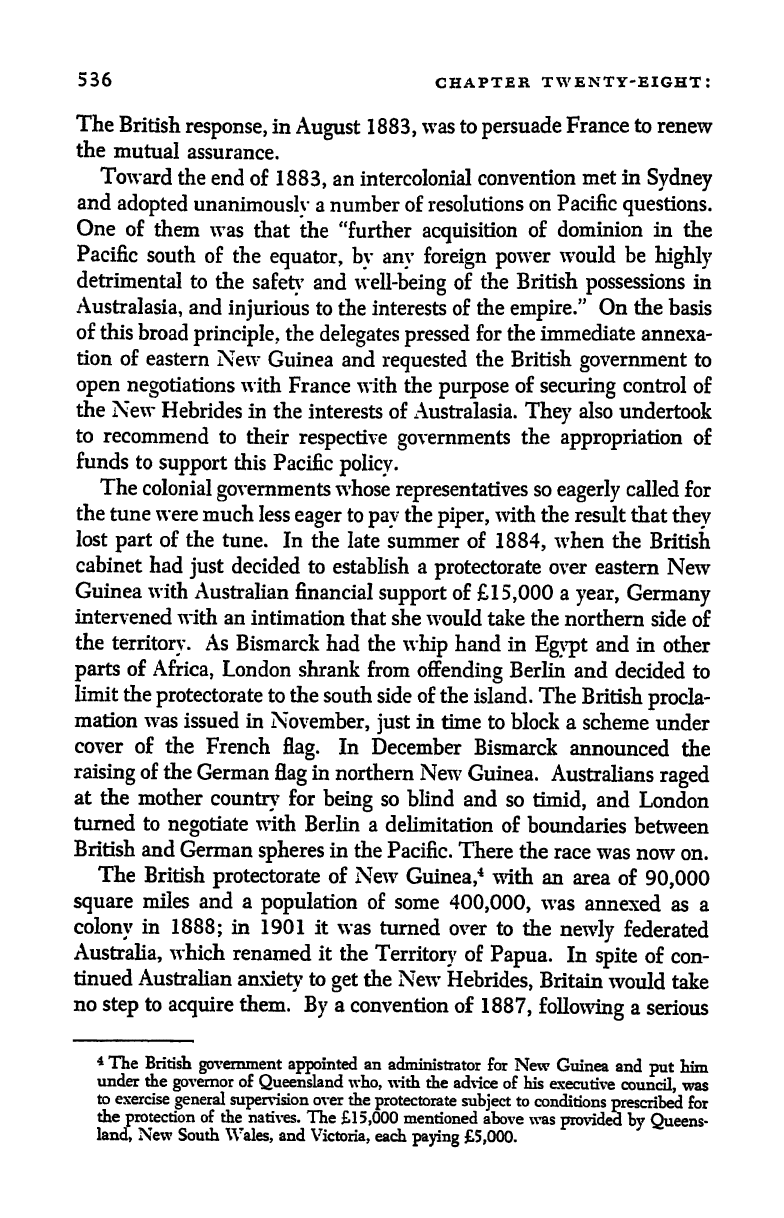
536
CHAPTER
TWENTY-EIGHT:
The
British
response,
in
August
1883,
was to
persuade
France
to
renew
the
mutual
assurance.
Toward
the
end
of
1883,
an intercolonial
convention
met in
Sydney
and
adopted
unanimously
a number
of resolutions
on
Pacific
questions.
One
of
them
was
that
the "further
acquisition
of
dominion in
the
Pacific
south
of
the
equator, by
any foreign
power
would
be
highly
detrimental to
the
safety
and
well-being
of
the
British
possessions
in
Australasia,
and
injurious
to
the
interests
of
the
empire."
On
the
basis
of
this
broad
principle,
the
delegates
pressed
for the
immediate
annexa-
tion
of
eastern
New
Guinea
and
requested
the British
government
to
open
negotiations
with
France
with the
purpose
of
securing
control
of
the
New
Hebrides
in the
interests
of
Australasia.
They
also
undertook
to
recommend
to their
respective
governments
the
appropriation
of
funds
to
support
this
Pacific
policy.
The
colonial
governments
whose
representatives
so
eagerly
called
for
the
tune were
much less
eager
to
pay
the
piper,
with the result
that
they
lost
part
of the
tune. In
the
late summer of
1884,
when the
British
cabinet
had
just
decided
to establish
a
protectorate
over eastern
New
Guinea
with
Australian
financial
support
of
15,000
a
year,
Germany
intervened
with
an
intimation that
she
would
take
the
northern
side
of
the
territory.
As
Bismarck
had
the
whip
hand in
Egypt
and in
other
parts
of
Africa,
London shrank
from
offending
Berlin
and
decided to
limit the
protectorate
to
the
south
side of the
island. The
British
procla-
mation
was
issued
in
November,
just
in
time to block
a
scheme
under
cover
of
the
French
flag.
In
December
Bismarck
announced the
raising
of the
German
flag
in northern
New
Guinea.
Australians
raged
at
the
mother
country
for
being
so
blind
and so
timid,
and
London
turned to
negotiate
with
Berlin a
delimitation
of
boundaries
between
British
and
German
spheres
in
the
Pacific.
There the
race
was
now
on.
The
British
protectorate
of New
Guinea,
4
with
an
area
of
90,000
square
miles
and
a
population
of
some
400,000,
was
annexed
as
a
colony
in
1888;
in 1901 it
was
turned
over
to the
newly
federated
Australia,
which
renamed
it
the
Territory
of
Papua.
In
spite
of
con-
tinued
Australian
anxiety
to
get
the New
Hebrides,
Britain
would
take
no
step
to
acquire
them.
By
a
convention
of
1887,
following
a
serious
4
The
British
government
appointed
an
administrator
for New
Guinea
and
put
him
under
the
governor
of
Queensland
who,
with
the
advice
of his
executive
council,
was
to
exercise
general
supervision
over
the
protectorate
subject
to
conditions
prescribed
for
the
protection
of
the natives.
The
15,000
mentioned
above
was
provided
by
Queens-
land,
New
South
Wales,
and
Victoria,
each
paying
5,000.
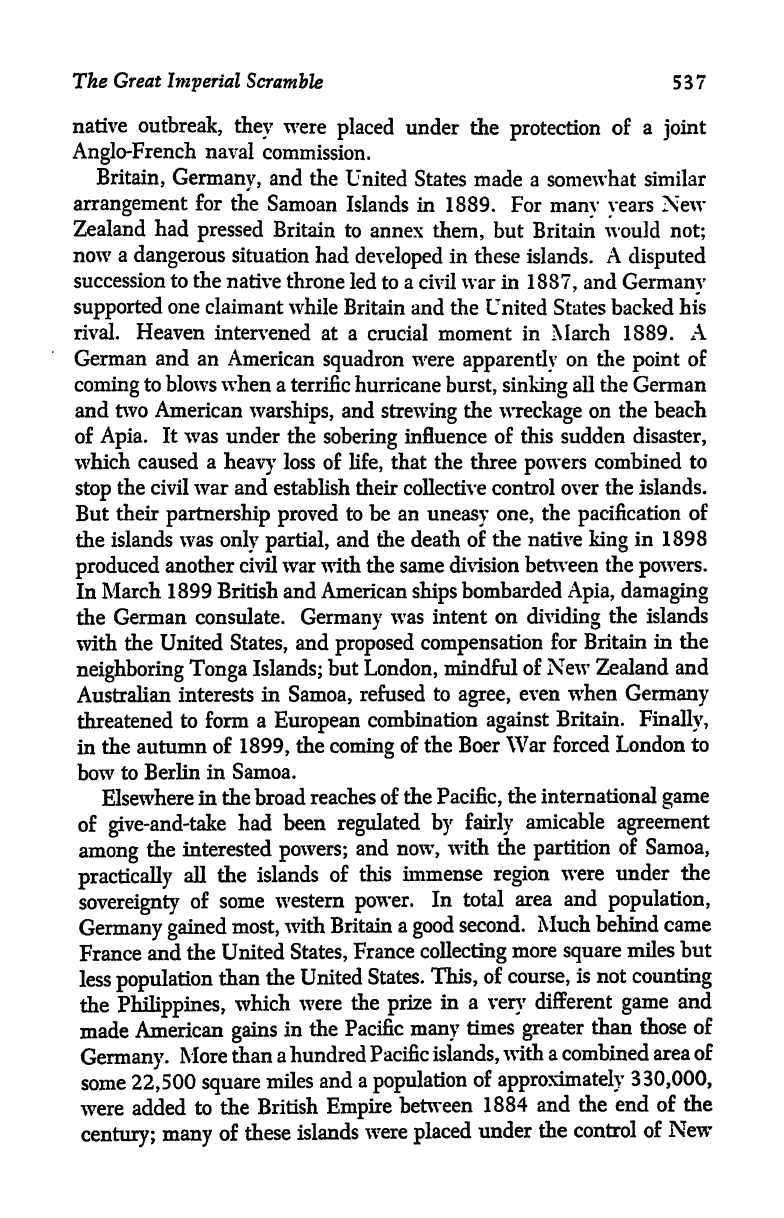
The
Great
Imperial
Scramble
537
native
outbreak,
they
were
placed
under
the
protection
of
a
joint
Anglo-French
naval
commission.
Britain,
Germany,
and
the
United States
made a somewhat
similar
arrangement
for
the
Samoan
Islands
in
1889. For
many years
New
Zealand had
pressed
Britain
to annex
them,
but Britain would
not;
now
a
dangerous
situation
had
developed
in
these islands.
A
disputed
succession
to the
native
throne
led
to
a
civil
war
in
1887,
and
Germany
supported
one
claimant
while
Britain and
the
United
States backed
his
rival.
Heaven
intervened at a
crucial moment in March
1889.
A
German
and an
American
squadron
were
apparently
on the
point
of
coming
to blows
when
a
terrific hurricane
burst,
sinking
all the German
and two American
warships,
and
strewing
the
wreckage
on
the
beach
of
Apia.
It was
under the
sobering
influence
of this sudden
disaster,
which
caused
a
heavy
loss
of
life,
that the
three
powers
combined
to
stop
the
civil
war
and
establish
their
collective
control
over
the islands.
But
their
partnership proved
to be an
uneasy
one,
the
pacification
of
the
islands
was
only partial,
and
the death of
the
native
king
in
1898
produced
another civil
war
with the same division
between
the
powers.
In
March 1899 British
and
American
ships
bombarded
Apia,
damaging
the
German
consulate.
Germany
was intent on
dividing
the islands
with the
United
States,
and
proposed
compensation
for
Britain in
the
neighboring
Tonga
Islands;
but
London,
mindful
of New Zealand
and
Australian
interests
in
Samoa,
refused to
agree,
even
when
Germany
threatened
to
form
a
European
combination
against
Britain.
Finally,
in
the autumn
of
1899,
the
coming
of
the Boer War
forced London
to
bow
to
Berlin
in
Samoa.
Elsewhere
in
the
broad
reaches
of
the
Pacific,
the international
game
of
give-and-take
had
been
regulated
by
fairly
amicable
agreement
among
the
interested
powers;
and
now,
with
the
partition
of
Samoa,
practically
all
the islands
of
this immense
region
were under
the
sovereignty
of
some
western
power.
In
total
area
and
population,
Germany gained
most,
with Britain
a
good
second.
Much
behind came
France
and
the United
States,
France
collecting
more
square
miles
but
less
population
than
the
United
States.
This,
of
course,
is not
counting
the
Philippines,
which
were
the
prize
in a
very
different
game
and
made
American
gains
in
the
Pacific
many
times
greater
than those of
Germany.
More
than
a
hundred Pacific
islands,
with a combined
area
of
some
22,500
square
miles
and
a
population
of
approximately
330,000,
were
added
to
the
British
Empire
between
1884
and
the end of
the
century;
many
of
these
islands
were
placed
under
the control of
New
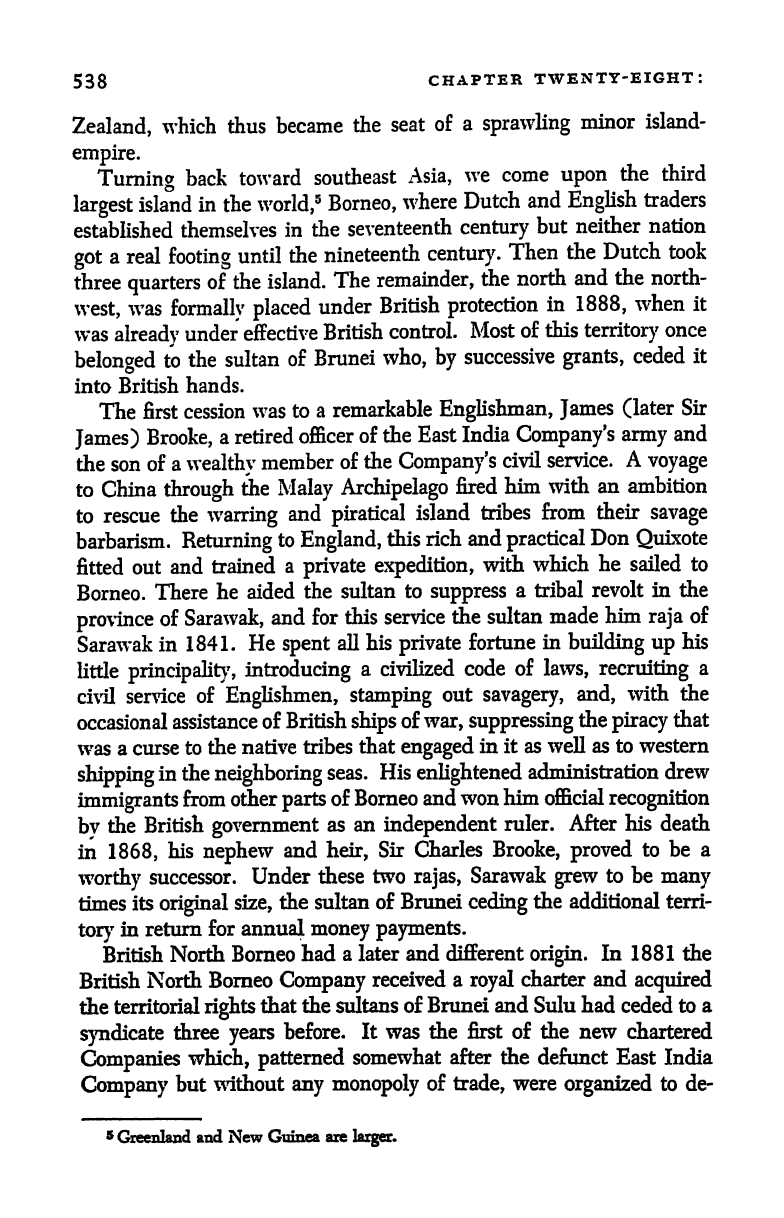
538
CHAPTER
TWENTY-EIGHT:
Zealand,
which
thus became
the
seat
of
a
sprawling
minor
island-
empire.
Turning
back
toward
southeast
Asia,
we
come
upon
the
third
largest
island
in
the
world,
5
Borneo,
where
Dutch
and
English
traders
established
themselves
in
the
seventeenth
century
but
neither nation
got
a
real
footing
until
the
nineteenth
century.
Then
the
Dutch took
three
quarters
of
the island.
The
remainder,
the
north
and
the north-
west,
was
formally
placed
under
British
protection
in
1888,
when it
was
already
under
effective
British
control.
Most
of
this
territory
once
belonged
to
the
sultan
of
Brunei
who,
by
successive
grants,
ceded
it
into British
hands.
The
first
cession
was
to
a remarkable
Englishman,
James
(later
Sir
James)
Brooke,
a
retired
officer
of
the
East
India
Company's
army
and
the
son
of
a
wealthy
member
of
the
Company's
civil
service.
A
voyage
to
China
through
die
Malay
Archipelago
fired
him
with
an ambition
to
rescue
the
warring
and
piratical
island
tribes
from
their
savage
barbarism.
Returning
to
England,
this
rich
and
practical
Don
Quixote
fitted
out
and
trained
a
private
expedition,
with
which
he
sailed to
Borneo.
There
he
aided
the sultan to
suppress
a
tribal
revolt
in the
province
of
Sarawak,
and
for
this service
the sultan
made
him
raja
of
Sarawak
in
1841.
He
spent
all
his
private
fortune
in
building
up
his
little
principality,
introducing
a
civilized
code
of
laws,
recruiting
a
civil
sendee
of
Englishmen,
stamping
out
savagery,
and,
with the
occasional
assistance
of
British
ships
of
war,
suppressing
the
piracy
that
was
a curse
to
the
native tribes
that
engaged
in
it as well as
to western
shipping
in
the
neighboring
seas.
His
enlightened
administration
drew
immigrants
from
other
parts
of
Borneo and
won
him
official
recognition
by
the British
government
as
an
independent
ruler.
After
his death
in
1868,
his
nephew
and
heir,
Sir Charles
Brooke,
proved
to
be
a
worthy
successor.
Under
these two
rajas,
Sarawak
grew
to
be
many
times
its
original
size,
the sultan
of
Brunei
ceding
the additional terri-
tory
in
return
for
annual
money payments.
British
North
Borneo
had
a
later
and different
origin.
In 1881 the
British
North Borneo
Company
received a
royal
charter and
acquired
the
territorial
rights
that the sultans
of
Brunei
and Sulu had ceded to
a
syndicate
three
years
before.
It was the first
of the new
chartered
Companies
which,
patterned
somewhat
after
the
defunct East
India
Company
but
without
any monopoly
of
trade,
were
organized
to
de-
&
Greenland
and
New
Guinea
are
larger.
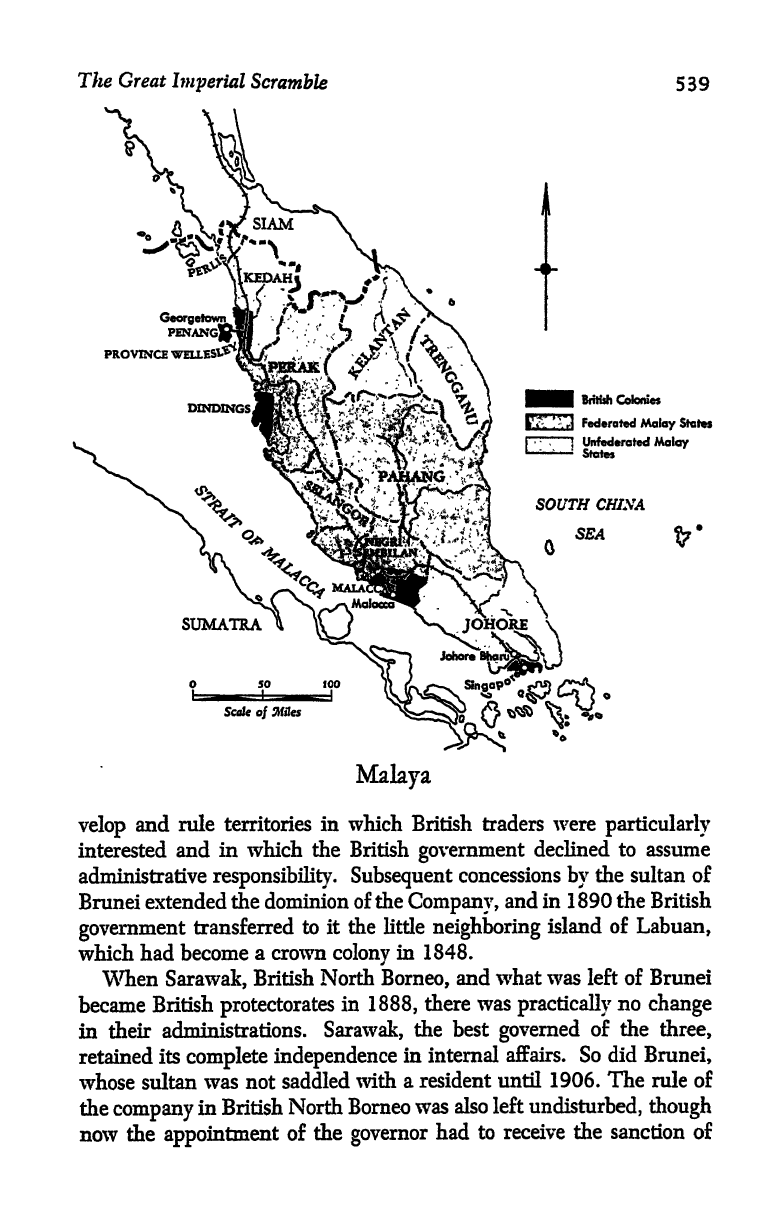
Ttie Great
Imperial
Scramble
539
British Colonies
Federated
Malay
States
Unfederated
Malay
States
SOUTH
CHLVA
SEA
Malaya
velop
and
rule
territories
in
which
British traders
were
particularly
interested
and
in which the
British
government
declined to assume
administrative
responsibility.
Subsequent
concessions
by
the sultan of
Brunei
extended
the
dominion
of
the
Company,
and
in
1890
the
British
government
transferred to
it the little
neighboring
island
of
Labuan,
which
had become
a
crown
colony
in
1848.
When
Sarawak,
British
North
Borneo,
and
what was left of
Brunei
became
British
protectorates
in
1888,
there
was
practically
no
change
in their
administrations.
Sarawak,
the best
governed
of the
three,
retained
its
complete
independence
in internal
affairs.
So
did
Brunei,
whose
sultan
was
not
saddled
with a
resident
until 1906. The rule of
the
company
in
British
North
Borneo
was
also left
undisturbed,
though
now
the
appointment
of
the
governor
had
to receive
the sanction
of
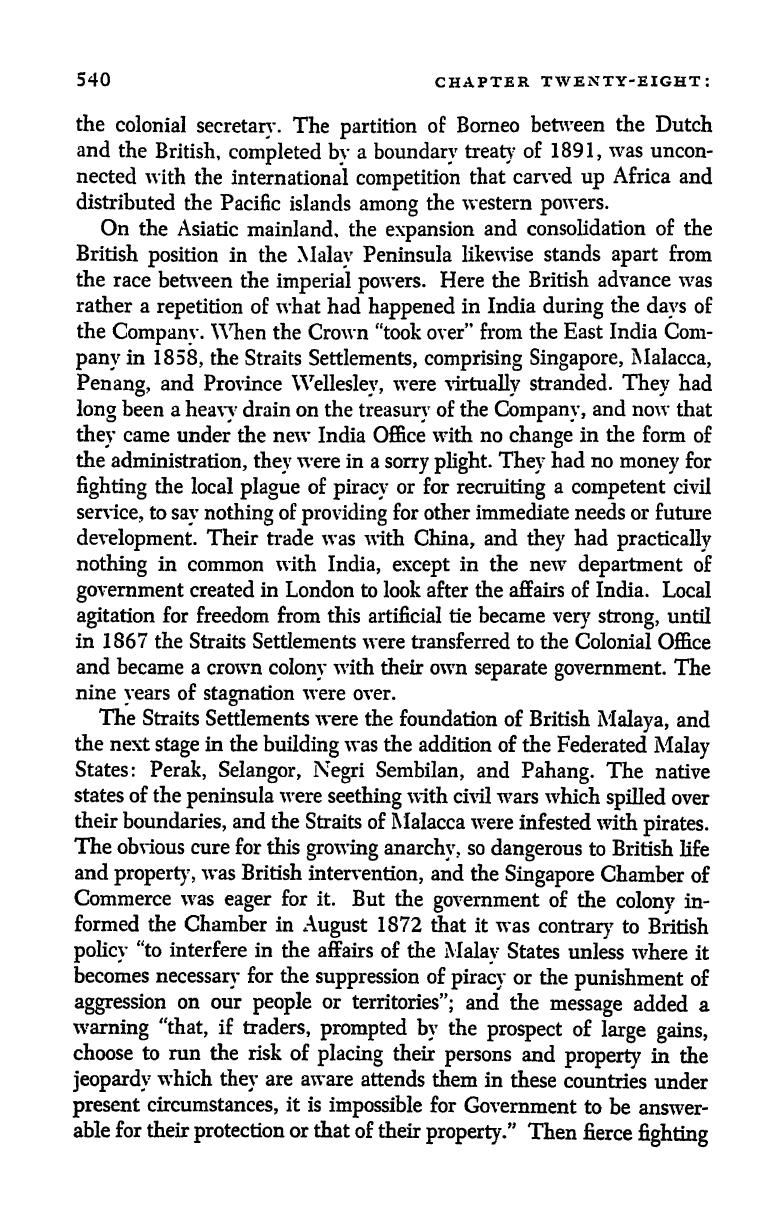
540
CHAPTER
TWENTY-EIGHT:
the
colonial
secretary.
The
partition
of
Borneo
between
the
Dutch
and
the
British,
completed
by
a
boundary
treaty
of
1891,
was
uncon-
nected
with
the
international
competition
that
carved
up
Africa
and
distributed the
Pacific
islands
among
the
western
powers.
On
the
Asiatic
mainland,
the
expansion
and consolidation
of
the
British
position
in
the
Malay
Peninsula
likewise
stands
apart
from
the
race
between
the
imperial
powers.
Here
the
British
advance
was
rather a
repetition
of
what
had
happened
in India
during
the
days
of
the
Company.
When the
Crown
"took over"
from
the
East
India
Com-
pany
in
1858,
the
Straits
Settlements,
comprising
Singapore,
Malacca,
Penang,
and Province
Wellesley,
were
virtually
stranded.
They
had
long
been a
heavy
drain
on
the
treasury
of
the
Company,
and
now
that
they
came under
the
new
India Office
with no
change
in
the
form
of
the
administration,
they
were
in
a
sorry plight.
They
had
no
money
for
fighting
the
local
plague
of
piracy
or for
recruiting
a
competent
civil
service,
to
say
nothing
of
providing
for
other immediate
needs
or
future
development.
Their
trade
was with
China,
and
they
had
practically
nothing
in
common with
India,
except
in
the new
department
of
government
created
in
London
to look
after the
affairs
of
India.
Local
agitation
for freedom from this
artificial
tie became
very
strong,
until
in
1867
the
Straits Settlements were
transferred
to the
Colonial Office
and became a
crown
colony
with
their
own
separate government.
The
nine
years
of
stagnation
were over.
The
Straits
Settlements were
the
foundation of British
Malaya,
and
the next
stage
in
the
building
was
the addition
of
the
Federated
Malay
States:
Perak,
Selangor,
Negri
Sembilan,
and
Pahang.
The
native
states of
the
peninsula
were
seething
with
civil
wars
which
spilled
over
their
boundaries,
and
the
Straits
of
Malacca were
infested
with
pirates.
The
obvious cure
for
this
growing
anarchy,
so
dangerous
to
British
life
and
property,
was British
intervention,
and
the
Singapore
Chamber
of
Commerce was
eager
for it.
But
the
government
of
the
colony
in-
formed
the
Chamber in
August
1872
that it
was
contrary
to
British
policy
"to
interfere in
the affairs
of the
Malay
States
unless
where
it
becomes
necessary
for the
suppression
of
piracy
or
the
punishment
of
aggression
on our
people
or
territories";
and
the
message
added
a
warning
"that,
if
traders,
prompted by
the
prospect
of
large
gains,
choose
to
run
the risk
of
placing
their
persons
and
property
in the
jeopardy
which
they
are
aware
attends
them in
these
countries
under
present
circumstances,
it
is
impossible
for
Government
to
be
answer-
able
for their
protection
or that
of
their
property."
Then
fierce
fighting
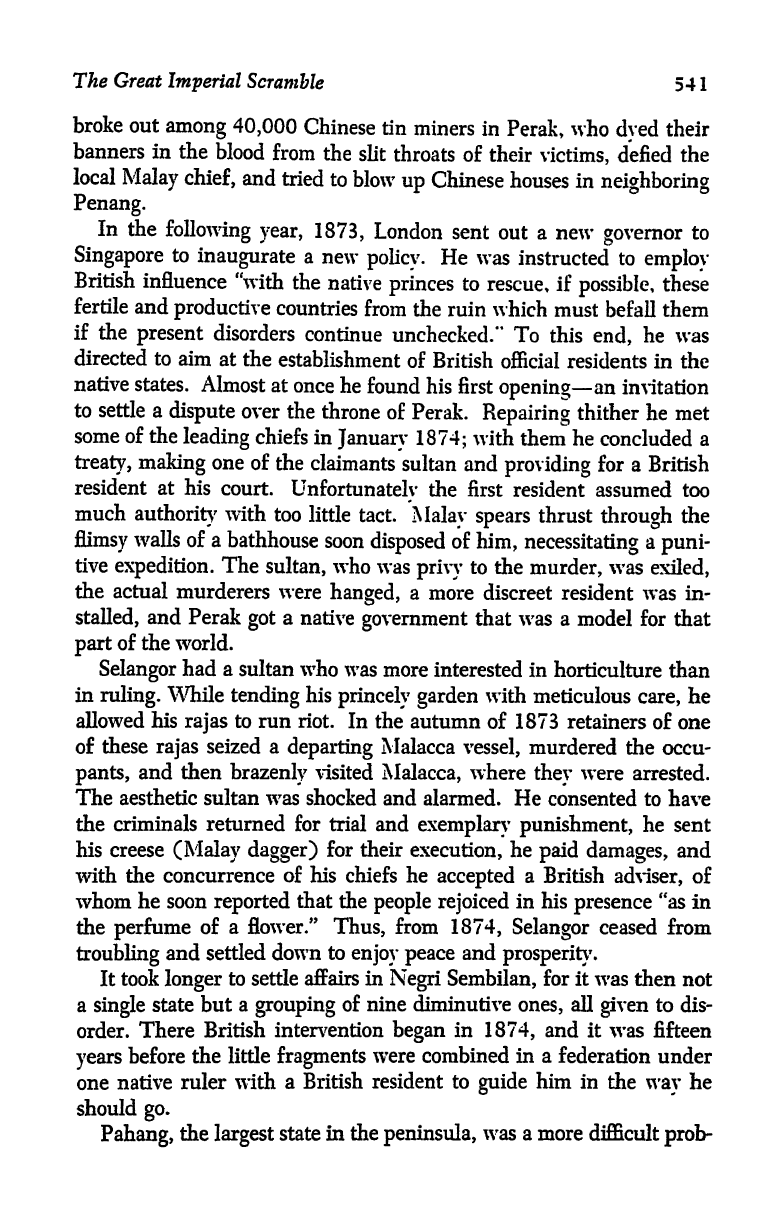
The
Great
Imperial
Scramble
541
broke
out
among
40,000
Chinese tin
miners in
Perak,
who
dyed
their
banners
in
the
blood
from
the
slit
throats of
their
victims,
defied
the
local
Malay
chief,
and
tried
to
blow
up
Chinese
houses
in
neighboring
Penang.
In
the
following
year,
1873,
London sent
out
a
new
governor
to
Singapore
to
inaugurate
a
new
policy.
He
was
instructed to
employ
British
influence
"with the
native
princes
to
rescue,
if
possible,
these
fertile
and
productive
countries
from
the ruin
which must
befall
them
if the
present
disorders
continue
unchecked." To
this
end,
he was
directed to
aim at
the
establishment
of
British
official residents
in
the
native
states.
Almost at
once he
found
his first
opening
an
invitation
to settle a
dispute
over
the
throne
of Perak.
Repairing
thither
he met
some of the
leading
chiefs in
January
1874;
with
them
he
concluded
a
treaty,
making
one
of
the
claimants
sultan
and
providing
for
a British
resident at
his
court.
Unfortunately
the first
resident
assumed too
much
authority
with
too
little
tact.
Malay spears
thrust
through
the
flimsy
walls of a
bathhouse
soon
disposed
of
him,
necessitating
a
puni-
tive
expedition.
The
sultan,
who
was
privy
to the
murder,
was
exiled,
the actual
murderers were
hanged,
a
more discreet
resident
was in-
stalled,
and
Perak
got
a
native
government
that was a
model
for that
part
of the
world.
Selangor
had
a
sultan
who was
more
interested in
horticulture
than
in
ruling.
While
tending
his
princely
garden
with
meticulous
care,
he
allowed
his
rajas
to run riot.
In the
autumn
of 1873
retainers
of one
of
these
rajas
seized
a
departing
Malacca
vessel,
murdered the
occu-
pants,
and then
brazenly
visited
Malacca,
where
they
were
arrested.
The aesthetic sultan was
shocked and
alarmed. He
consented to have
the criminals returned for
trial and
exemplar}' punishment,
he
sent
his creese
(Malay
dagger)
for
their
execution,
he
paid
damages,
and
with
the
concurrence of his chiefs he
accepted
a
British
adviser,
of
whom
he soon
reported
that the
people rejoiced
in his
presence
"as in
the
perfume
of
a
flower."
Thus,
from
1874,
Selangor
ceased
from
troubling
and settled down
to
enjoy peace
and
prosperity.
It took
longer
to settle
affairs in
Negri
Sembilan,
for it
was
then not
a
single
state but
a
grouping
of
nine diminutive
ones,
all
given
to
dis-
order.
There
British
intervention
began
in
1874,
and
it was
fifteen
years
before
the little
fragments
were combined in
a
federation
under
one
native
ruler
with
a
British resident to
guide
him in
the
way
he
should
go.
Pahang,
the
largest
state in
the
peninsula,
was a
more
difficult
prob-
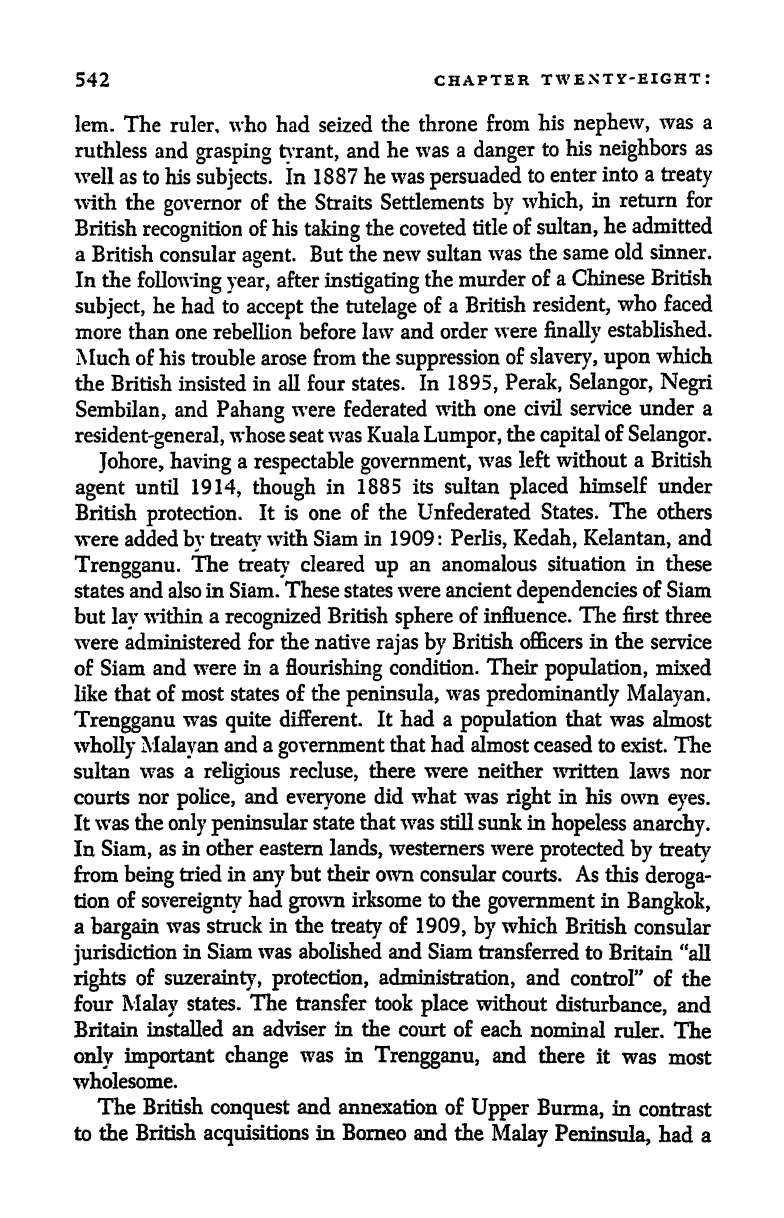
542
CHAPTER
TWENTY-EIGHT:
lem.
The
ruler,
who
had
seized
the
throne
from
his
nephew,
was a
ruthless
and
grasping
tyrant,
and
he was
a
danger
to
his
neighbors
as
well
as
to his
subjects.
In
1887
he
was
persuaded
to
enter
into
a
treaty
with
the
governor
of the Straits
Settlements
by
which,
in
return
for
British
recognition
of his
taking
the
coveted
title
of
sultan,
he
admitted
a
British consular
agent.
But
the new
sultan
was
the
same
old
sinner.
In the
following
year,
after
instigating
the
murder
of
a
Chinese
British
subject,
he
had
to
accept
the
tutelage
of
a British
resident,
who
faced
more than one
rebellion
before
law and
order
were
finally
established.
Much
of
his
trouble
arose
from
the
suppression
of
slaver)
7
,
upon
which
the British insisted
in all four
states.
In
1895,
Perak,
Selangor,
Negri
Sembilan,
and
Pahang
were federated
with one
civil
service
under
a
resident-general,
whose seat
was Kuala
Lumpor,
the
capital
of
Selangor.
Johore,
having
a
respectable
government,
was
left
without a
British
agent
until
1914,
though
in
1885
its sultan
placed
himself
under
British
protection.
It
is
one
of the
Unfederated
States.
The
others
were added
by treat}'
with Siam
in
1909:
Perlis,
Kedah, Kelantan,
and
Trengganu.
The
treaty
cleared
up
an
anomalous
situation
in
these
states and also
in
Siam.
These states
were ancient
dependencies
of
Siam
but
lay
within
a
recognized
British
sphere
of influence.
The
first
three
were
administered for the
native
rajas by
British officers in the
service
of Siam
and
were in a
flourishing
condition.
Their
population,
mixed
like that
of most states
of the
peninsula,
was
predominantly Malayan.
Trengganu
was
quite
different. It had
a
population
that
was
almost
wholly
Malayan
and
a
government
that
had
almost ceased to
exist.
The
sultan
was
a
religious
recluse,
there were neither
written
laws
nor
courts
nor
police,
and
everyone
did what
was
right
in
his
own
eyes.
It
was the
only peninsular
state
that was
still
sunk
in
hopeless
anarchy.
In
Siam,
as
in
other
eastern
lands,
westerners were
protected
by
treaty
from
being
tried in
any
but
their
own
consular courts.
As
this
deroga-
tion of
sovereignty
had
grown
irksome to the
government
in
Bangkok,
a
bargain
was
struck
in the
treaty
of
1909,
by
which
British
consular
jurisdiction
in Siam
was
abolished
and
Siam
transferred
to
Britain
"all
rights
of
suzerainty, protection,
administration,
and
control"
of
the
four
Malay
states.
The transfer
took
place
without
disturbance,
and
Britain
installed
an
adviser
in
the
court
of
each
nominal
ruler.
The
only important
change
was in
Trengganu,
and
there
it
was
most
wholesome.
The
British
conquest
and
annexation
of
Upper
Burma,
in
contrast
to
the British
acquisitions
in
Borneo and
the
Malay
Peninsula,
had a
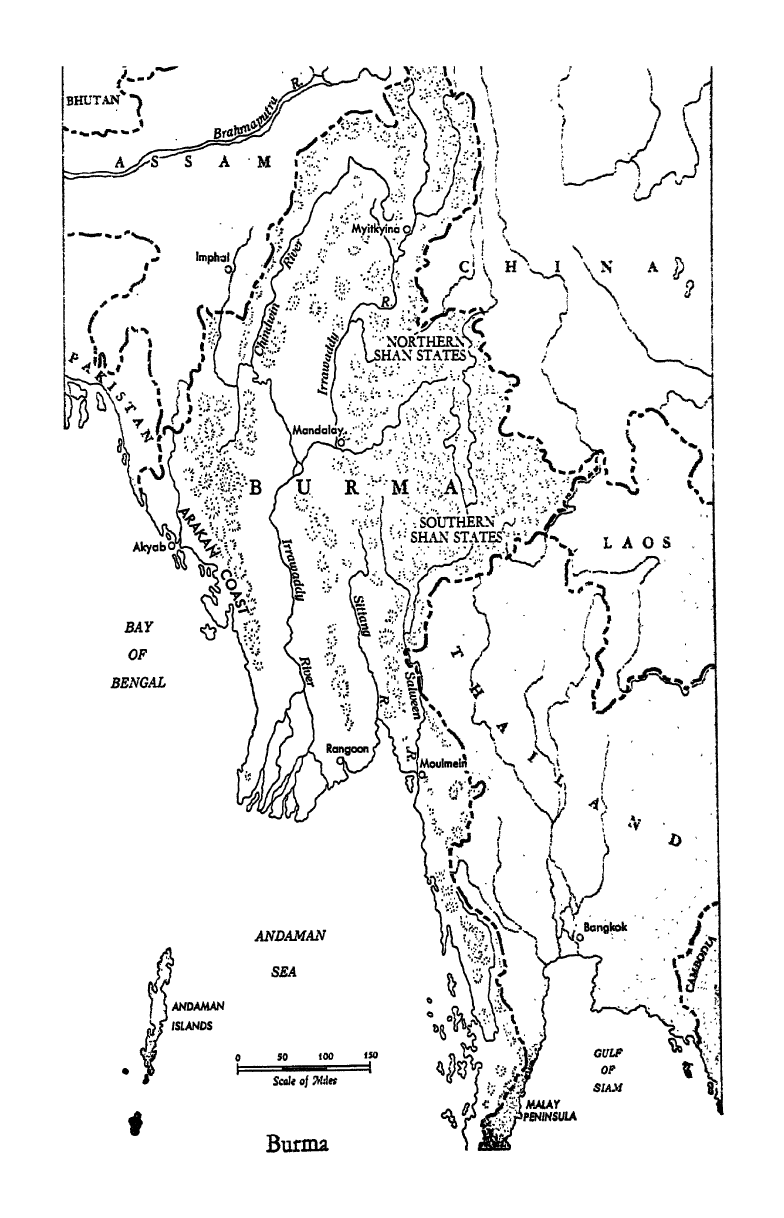
SOUTHERN
rJ
SHAN
STATES^*':
ll
Burma
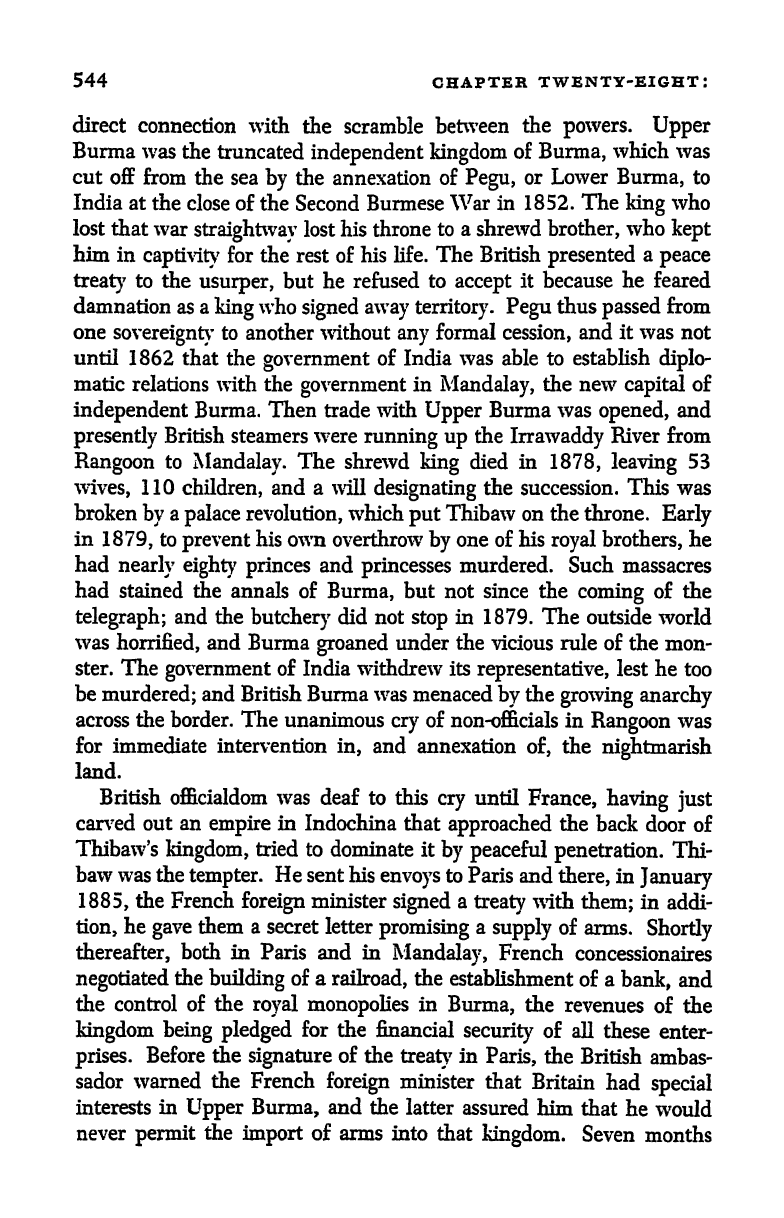
544
CHAPTER
TWENTY-EIGHT:
direct
connection
with
the
scramble
between
the
powers. Upper
Burma
was
the
truncated
independent
kingdom
of
Burma,
which was
cut
off from
the
sea
by
the
annexation
of
Pegu,
or Lower
Burma,
to
India at
the
close
of
the
Second
Burmese
War
in 1852.
The
king
who
lost
that
war
straightway
lost
his
throne
to
a
shrewd
brother,
who
kept
him
in
captivity
for
the rest
of
his
life.
The
British
presented
a
peace
treat}
7
to the
usurper,
but
he refused
to
accept
it because
he
feared
damnation
as
a
king
who
signed
away
territory.
Pegu
thus
passed
from
one
sovereignty
to
another
without
any
formal
cession,
and
it was
not
until
1862 that
the
government
of
India
was able to
establish
diplo-
matic
relations with
the
government
in
Mandalay,
the
new
capital
of
independent
Burma.
Then
trade with
Upper
Burma was
opened,
and
presently
British steamers were
running
up
the
Irrawaddy
River from
Rangoon
to
Mandalay.
The shrewd
king
died
in
1878,
leaving
53
wives,
110
children,
and a
will
designating
the
succession.
This was
broken
by
a
palace
revolution,
which
put
Thibaw
on
the throne.
Early
in
1879,
to
prevent
his own
overthrow
by
one of
his
royal
brothers,
he
had
nearly
eighty princes
and
princesses
murdered.
Such
massacres
had stained
the
annals
of
Burma,
but
not since the
coming
of the
telegraph;
and the
butchery
did
not
stop
in 1879. The outside
world
was
horrified,
and Burma
groaned
under
the
vicious
rule of
the
mon-
ster. The
government
of
India
withdrew its
representative,
lest he
too
be
murdered;
and British Burma
was menaced
by
the
growing anarchy
across
the
border. The
unanimous
cry
of
non-officials
in
Rangoon
was
for
immediate
intervention
in,
and
annexation
of,
the
nightmarish
land.
British officialdom
was deaf
to this
cry
until
France,
having
just
carved out
an
empire
in
Indochina
that
approached
the
back
door of
Thibaw's
kingdom,
tried to
dominate it
by peaceful
penetration.
Thi-
baw
was
the
tempter.
He sent
his
envoys
to Paris
and
there,
in
January
1885,
the French
foreign
minister
signed
a
treaty
with
them;
in
addi-
tion,
he
gave
them
a
secret letter
promising
a
supply
of
arms.
Shortly
thereafter,
both in
Paris
and
in
Mandalay,
French
concessionaires
negotiated
the
building
of a
railroad,
the
establishment of
a
bank,
and
the
control
of
the
royal monopolies
in
Burma,
the
revenues
of the
kingdom
being
pledged
for
the
financial
security
of all
these
enter-
prises.
Before
the
signature
of
the
treaty'
in
Paris,
the
British
ambas-
sador warned
the French
foreign
minister that
Britain
had
special
interests
in
Upper
Burma,
and
the
latter
assured
him
that
he
would
never
permit
the
import
of
arms
into
that
kingdom.
Seven
months
